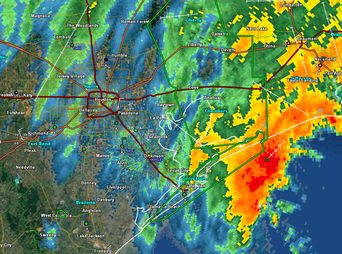
Managing Challenge = Managing Self
in the Service of Recovery from Hurricane Harvey
Houston and the Gulf Coast of Texas and Louisiana are recovering from the worst flood in history. Parts of Florida are in the aftermath of Hurricane Irma. Puerto Rico and Caribbean islands have catastrophic damage that has not yet been assessed. The earthquake in Mexico City has created chaotic conditions in much of the city. Some immediate emergencies persist and the challenges involved in recovery have just begun.
How can people best deal with the emotional impact for themselves and on their family and friends?
Bowen family systems theory provides a framework for understanding and managing the impact of challenges associated with such a disaster that is different from conventional mental health approaches. Trauma theory, group theory and other common therapy approaches emphasize expressing or sharing feelings and depending upon others, often professionals, for support.
Bowen theory, coupled with biology and neurosciences, provide practical principles aimed toward engaging the ability to rely upon self, to connect with family resources, to think in the face of reacting, and to be a resource for capability within a family. These principles can be learned and used by anyone, whether in a shelter or home, on a raft or in an office, in a classroom or church. They can be practiced in the midst of an emergency or in the aftermath. They begin with managing self.
Here are some guidelines that I practice as a family member, a therapist and teacher. They can be helpful in dealing with the challenges that come with disasters.
1. Observe reactions and interrupt or manage your own anxious reactions
- Note patterns like conflict, distance, doing for others, helplessness, blaming others, symptoms and focus on symptoms. These all occur when anxiety rises between people. Tone down your own part.
- Observe body reactions. Touch your fingers to your face. Are they cooler or warmer than your cheeks? When they are, this is a sign of a stressed nervous system. Be aware of breathing and speech patterns. Rapid breathing and talking quickly reflect excitement. Slow or deepen each breath. Pause for a heartbeat at the top of a breath and at the bottom of it. When you manage your breathing while talking to someone, you are better able to transmit stability.
- When time permits, sit quietly for 20 minutes without TV or cell phone. Let your breathing be slow and full. Let thoughts come and go while you focus on yourself in the chair, your feet upon the floor, your hands folded in your lap. Sitting quietly will shift brain activity away from reacting and toward thoughtfulness.
2. Activate and engage thinking in the face of reacting.
- Everyone reacts. Engage thinking with factual “Who, What, When, Where, How” questions: What is going on? Who is involved? When did this begin? Is this an emergency or not? To whom am I reacting?How can I manage those reactions better?
- What is my/your best thinking about how things can work out OK? Make a list of goals and organize priorities. What is the next best step to take? Shift to “I THINK I CAN” thinking.
- Think ahead to the consequences of a choice or decision. No choice or decision is perfect. Unless there is an immediate danger, it’s good to consider up to five solutions to a problem. When people can interrupt their reacting, interesting avenues and resources may emerge.
3. Focus on what is responsible and realistic in this situation.
- What do I/you need to do to be responsible? What are the most important responsibilities for self? as a parent? family member? for work? What is important now? What can wait? Convert these to goals.
- Work on the ability to think rather than telling someone else what to think or what to do.
- What do you think that your child, spouse or parent can do for himself or herself right now? Can you decline to do what someone can do for herself?
4. Initiate and maintain contact with family and friends.
- Even thinking about family and friends can help. Who are the calmest and calming family or friends? Who will be concerned about you? Whom are you worried about? Who has been through something like this?
- Make a plan to make and maintain contact with family and friends. Who is on your list to contact? What is the best method for each? When can you do it?
- Make contact with famiy and friends who are in the midst of challenges. Practice being thoughtful.
Everyone is affected, but recovery from a disaster, Flood Harvey for example, will vary. Many people do well in an acute situation or danger when the focus is on immediate survival or helping others. The challenges of long, drawn-out recovery may be more difficult. Reactions will vary.
The Harvey flood is a dramatic example of how different the damage itself can be. Some people had very little damage and others had their homes and cars and communities under water. The degree of damage may not determine the impact however. How people react in an event may have more impact than the event itself.




I spent the afternoon at the Hairbenders Salon in Kingwood where women whose homes flooded were getting their hair cut or curled in the aftermath of the flood.
It was the best place to meet an old family friend whose cars and home flooded to loan her my car. As my friend described the damage to her home, her hairdresser said “Now is sure a good time to do that redecorating you’ve been talking about.” That got a laugh and an immediate change in stress reactions.
There are families who experienced deaths and births, postponed weddings, and moved to college in the midst of this storm. The degree of disturbance in family relationships is a better predictor of impact. It can be very important to consider the functioning of the person and the family before and during the flood. What are the resources and what are the stresses already present when challenges occur?
When reactions become chronic…or ….when a disaster comes in the midst of already chronic anxiety, it becomes more difficult. Symptoms stirred however may motivate people to take important steps toward greater stability and maturity.
People who can “make a research project” out of a problem will fare better. Yes, this is one of nature’s unwelcome research projects. It is not the first and it will not be the last. What can we, each and all, learn from this disaster? Can lessons from Flood Harvey be useful for the future and in other parts of the country or world? People who can see the opportunities to accomplish or contribute or learn something will fare better. People who can be responsible for themselves while helping others will fare better. It is never a perfect balance and erring and correcting is part of the process.
Please check the CSNSF (Center for the Study of Natural Systems and the Family) Facebook page for curated articles and comments in an effort to bring Bowen theory and systems thinking to bear in the aftermath of Harvey. There are many good resources on Facebook and I will share some of them as well. Please post comments and questions and your own best thinking there. Let me know if you have ideas or questions about how you might contribute at this time or how Bowen theory can be put to good use.
Thank you. Victoria Harrison




Great article! I have one question regarding this quote, ” Touch your fingers to your face. Are they cooler or warmer than your cheeks? When they are, this is a sign of a stressed nervous system.” It’s not clear to me whether cooler or warmer fingers are a sign of a stressed nervous system.